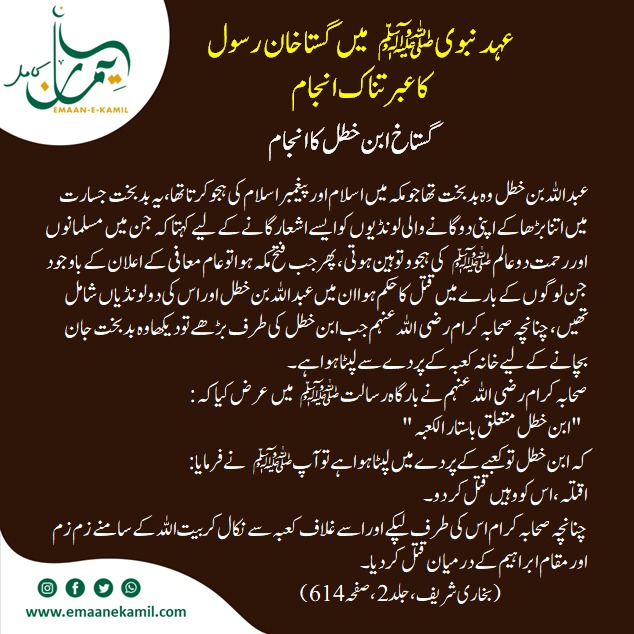Namoos-e-Risalat ﷺ
Namoos-e-Risalat ﷺ means that Honor and Respect of Prophet Muhammad ﷺ is the basis of Emaan. If anyone believes in the prophethood of Prophet Muhammad ﷺ, believes in the finality of HIS prophethood, considers QURAN as the last book from Allah, believes that there is only One God who created the universe and has faith in all Islamic beliefs but does not consider Honor and Respect of Prophet Muhammad ﷺ a fundamental belief of Emaan, then despite of having faith in all Islamic beliefs, he will be considered as Kafir.
ناموس رسالت ﷺ
عقیدہ ناموس رسالت ﷺیہ ہے کہ جو شخص حضور نبی اکرم ﷺ کی نبوت و رسالت اور آپکی ختم نبوت پر اعتقاد رکھتا ہو، قرآن کریم کو اللہ تعالیٰ کی نازل کردہ آخری کتاب مانے ، اللہ تبارک وتعالیٰ کی وحدانیت پر بھی ایمان لائے اور تمام اسلامی عقائد کو دل سے تسلیم کرتا ہو لیکن صرف حضور نبی اکرم ﷺ کی تعظیم وتکریم پر ایمان نہ رکھے اور اسے ضروری نہ سمجھے تو وہ سب باتیں ماننے کے باوجود دائرہ اسلام سے خارج ہے۔ تعظیم و تکریم رسالتمآب ﷺ ضروریات دین میں سے ہے اور آپ ﷺ کی تعظیم وتکریم ہی اصل ایمان کی بنیاد ہے ۔
Namoos-e-Risalat ﷺ in the Ahadith
ناموس رسالتﷺ احادیث کی روشنی میں
’’ہر مسلمان جو اپنے ایمان کی تکمیل چاہتا ہے اس کے لیے لازم ہے کہ وہ نبی کریم ﷺ کے ساتھ اپنے بچوں ، خاندان، والدین اور دنیا کی ہر محبوب ترین شے سے بڑھ کر پیار کرے۔ ‘‘ (صحیح بخاری، کتاب الایمان باب حب الرسول من الایمان)
Namoos-e-Risalat ﷺ in the Quran
قرآن مجید میں ناموس رسالتﷺ کا تصور
حضور نبی اکرم ﷺ کی ناموس کا ذکر قرآن حکیم میں نہایت جامع انداز میں کیا گیا ہے۔ارشادِ خداوندی ہے :
’’( اے لوگو ) تم اللہ اور اس کے رسول ﷺ پر ایمان لاؤ اور ان کی تعظیم و توقیر کرو ۔‘‘
(9:63 الفتح)
’’ تم لوگ رسول ﷺ کے بُلانے کو ایسے ہرگز نہ سمجھنا جیسے تم آپس میں ایک دوسرے کو بُلاتے ہو۔‘‘
(النور63:24)
Namoos-e-Risalat ﷺ in the Eyes of Saints and Islamic Scholars
ناموس رسالتﷺاولیاء کرام اور علماءکرام کی نظر میں
:حافظ ابن کثیر اپنی تفسیر میں لکھتے ہیں
’’ رسول اللہ ﷺ کی قبر انور کے باہر آواز بلند کرنا مکروہ ہے جیسا کہ حضورﷺ کی حیات ظاہری میں آپﷺ کے سامنے آواز بلند کرنا نا پسندیدہ اور مکروہ تھا۔ اس لئے کہ حضورﷺ ہمیشہ ہمیشہ کے لئے اپنی قبر انور میں زندہ ہیں اور اپنی حیات ظاہری کی طرح واجب الاحترام بھی ہیں ۔‘‘ (تفسیرابن کثیر، 207:4 )
Namoos-e-Risalat ﷺ in the Eyes of Sahabah, Muhaddasin and Imams of all Fiqhs
ناموس رسالتﷺصحابہ کرام ، محدثین اور آئمہ کرام کی نظرمیں
خلیفہ ہارون رشید نے امام مالک ؒسے گستاخ رسول کے بارے میں حکم دریافت کیا تو امام مالک ؒ نے جواب دیا: ’’اس امت کے باقی رہنےکا کیا جواز ہے جس کے نبی کی توہین کر دی جائے ۔جو انبیاء کی توہین کرے اس کو قتل کیا جائے اور جو نبی کریمﷺ کے صحابہ کی توہین کرے اسے کوڑےلگائے جائیں ‘‘ ( امام مالک ؒ ،الشفاء للقاضی عیاض، جزو 2، القسم الرابع، باب الاوّل)





